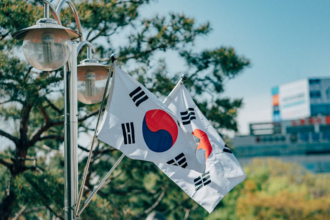In a dramatic turn of events, the Prime Minister of Bangladesh has resigned and left the country, with her destination currently unknown. This development comes as thousands of protesters stormed the Prime Minister’s residence, leading to widespread celebrations on the streets.
Since the protests erupted a month ago, foreign journalists have faced difficulties entering the country, resulting in heavy reliance on freelance journalists within Bangladesh. Reports from these journalists describe scenes of jubilation, with people hugging, exchanging garlands, and celebrating the Prime Minister’s resignation. Many media outlets have confirmed that the Prime Minister has indeed left the country.
The Prime Minister’s resignation marks a significant moment for Bangladesh, especially considering she was re-elected for a fourth term in January. However, these elections were marred by controversy, with the main opposition party boycotting the elections and crackdowns on other opposition members attempting to campaign. This raised serious questions about the legitimacy of the elections and the state of democracy in Bangladesh.
Protests, initially led by student leaders, had escalated into a broader movement demanding the Prime Minister’s resignation. On Sunday, the situation turned violent, with at least 90 people killed and hundreds more injured in clashes between police and anti-government protesters. Among the dead were 13 police officers.
The Prime Minister’s government has been criticized for its increasingly authoritarian rule, both in this term and previous ones. The protests originally started as a movement against quotas in civil government jobs but quickly grew into a larger anti-government campaign.
The ruling government labeled the protesters as terrorists, claiming they were acting on behalf of opposition parties. However, the Prime Minister’s resignation and departure suggest a loss of confidence within her government and possibly within the military, which did not intervene against the student-led protests.
The Prime Minister has essentially been in power since 2009, making her departure a monumental shift in Bangladesh’s political landscape. Observers note that the police’s harsh crackdown on protests, resulting in around 300 deaths over the past month, is the worst violence the country has seen since its war of independence in 1971.
Protesters have been seen looting and destroying the Prime Minister’s residence, reflecting a cathartic reaction to years of perceived authoritarian rule. This rapid series of events, including a delayed address by the Army Chief and police allowing protesters into Dhaka, indicate significant shifts within the government.
As the situation unfolds, there are concerns about a potential power vacuum and the future leadership structure of Bangladesh. There are questions about whether the military will step in to maintain order until a new government can be formed.
The dramatic resignation and flight of the Prime Minister marked a pivotal moment in Bangladesh’s history, with the country’s future political stability hanging in the balance.








